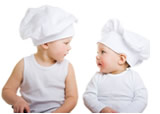
 Cooking with Kids
Cooking with KidsThey love it… so why not incorporate it into your program
As witnessed by the recent Australian Junior Masterchef Phenomenon, kids love food and they love to cook. Teaching kids about great food and involving them in the preparation of a few simple dishes is a wonderful way of introducing them to new flavours and many kids will try something they helped prepare.
Kids of all ages can participate in cooking, you will just need to allocate tasks according to the age and physical capabilities of the kids in your group:
Under Twos - may be too young to participate in most of the activities but will enjoy being with older children during cooking projects and will love the sights, sounds and smells of the kitchen.
- Talk about what you are doing as you move around the kitchen and describe the utensils and ingredients you are using.
- Give babies a plastic bowl and mixing spoon for them to bang and pretend to mix with.
- Talk about what babies like to eat and how delicious the finished product will be.
- Let them mix ingredients which are baby-safe and not too messy.
- Let them smell the ingredients and if appropriate hold them and feel them.
- scrubbing vegetables and fruits
- wiping and setting tables
- dipping vegetables and fruits
- tearing lettuce and salad greens
- Investigating and playing with cooking utensils
- Naming and counting ingredients
- Moving and pouring ingredients from one container into another
- Pouring liquids/eggs into a batter
- Stirring and mixing ingredients together using a variety of utensils
- Kneading and shaping doughs
- Shaking liquids
- Spreading ingredients such as butter, peanut butter, cream cheese, tomato paste and hummus on to bread, pizza bases, wraps etc
- juicing oranges, lemons, and limes
- mashing soft fruits and vegetables
- peeling eggs
- measuring dry and liquid ingredients
- beating eggs with an eggbeater
- Using dull kitchen scissors to cut parsley and other herbs
- Using an egg beater
According to the Better Kid Care Program there are a load of things that can be taught through cooking in the child care environment:
- Cooking involves reading and talking. There is much to talk about as a recipe is read, followed and then prepared through the allocation of tasks and preparation of ingredients and utensils.
- Children learn math skills through counting, measuring, and following step-by-step directions.
- Science is learned as children see how food changes during cooking. They learn about hot and cold, floating and sinking, dissolving, melting, and freezing.
- Good nutrition is encouraged through cooking. Seeing exactly what goes into a recipe helps children learn to make better decisions about the food they eat.
- Children can learn about and connect with other cultures as they prepare foods from various cultural groups.
- Thinking skills are developed as children learn to compare and make relationships in food preparation. If we use too much flour in our biscuit recipe, the result is a dry, hard biscuit.
- Proportions are easily mastered when children learn that if you double the ingredients in the biscuit recipe, you end up with double the biscuits.
- Social skills are practiced in cooking when children work together, take turns, and solve problems.
- Most importantly, self-esteem abounds when children prepare foods for themselves and others.
- Good cooks of all ages always wash their hands before cooking.
- Wait until the dish is done before sampling it, this will help prevent illness.
- Expect spills and messes.
- Children have short attention spans. Give them quick, simple jobs, and give instructions one at a time.
- Children get excited and forget. Repeat directions as often as needed.
- Young cooks need constant supervision.
- Give children jobs to help with cleanup.
© 2010 - All rights reserved
Care For Kids Internet Services Pty Ltd
ABN 55 104 145 735
PO Box 543 Balmain NSW 2041
privacy policy contact us